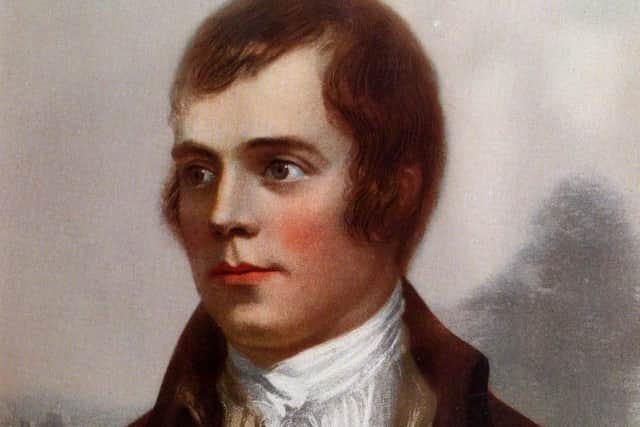BBC to air Robert Burns documentary with a warning due to "bad unclean filthy" versus
But a new BBC Scotland documentary on Burns, featuring some of his less well known verses will come with a warning to viewers -- because of their shockingly vulgar language.
Inside the Mind of Robert Burns, to be shown on the BBC Scotland channel at 10pm on Tuesday is described by the broadcaster as a "detailed look at the man, rather than the legend" who is celebrated across the world on Burns Night.
Advertisement
Hide AdAdvertisement
Hide Ad

A popular version of Burns' song "Green Grow the Rashes" is performed to an audience by award winning folk singer Robyn Stapleton -- but Bisset reveals the former BBC Radio Scotland’s Young Traditional Musician of the Year refused to sing Burns' bawdy version "because of certain words"
Instead the less well known words are performed -- complete with c-word twice -- by Scottish Mary Queen of Scots actor Andrew Rothney.
Such verses were collected by Burns in the book The Merry Muses of Caledonia. First published in 1799, three years after Burns' death, it was labelled in the 19th century as "not for maids, ministers or striplings".
The verses still have the power to shock.
Rothney also recites a song known as "Why Shouldn't Poor Folk Mowe", which includes a variety of expletives not usually associated with Scotland's national poet.
One line alone reads: "May the deil in her a**e ram a huge pr**ck o' brass, and damn her in hell with a mowe."
BBC Scotland confirmed that viewers will be forewarned about the language on the programme, which will be repeated on BBC Scotland at 9.40pm on Burns Night and also made available to viewers everywhere on BBC iPlayer.
The broadcaster said the programme was taking "an unflinching look at Robert Burns, including his attitudes to women which appear by turns to be reverential and disrespectful".
A BBC Scotland spokesperson said: "Many Burns aficionados are aware of these songs, which were performed in 'gentlemen’s clubs' at the time.
Advertisement
Hide AdAdvertisement
Hide Ad"It is not a great secret they exist, but the actual content is not widely known and to have a proper conversation about what they say about Burns means letting people have a clearer understanding of exactly what these songs say.
"The programme is looking at Burns 'in the round' -- his genius but also his failings. It is therefore appropriate to include performances of these songs, and present the context in which they would have been heard in his times, reflecting that while Robert Burns is heralded across the world for love songs such as Ae Fond Kiss, there is also other material which shows his attitude to women in a different, possibly disturbing, light.
"As is normal with such content, the audience for this programme will be warned in advance for both transmission and BBC iPlayer."
The "Ploughman Poet" from Ayrshire travelled to Edinburgh after the success of his work, "Poems, Chiefly in the Scottish Dialect", in 1787.
He befriended the printer William Smellie, who was editor of the Encyclopaedia Britannica and a founder of the Crochallan Fensibles, a drinking club that met in Douglas's Tavern, just off the Royal Mile in Anchor Close. It was for the club that Burns collected the songs known as The Merry Muses.
Burns biographer Professor Robert Crawford, of the University of St Andrews, said: "When he goes to Edinburgh, these aren't his working class clubs; these are clubs with military people, with middle class people in them as well, so they put away the booze, they recite bawdy songs to each other, they go in for kinds of sexual boasting and bawdry.
"And Burns collects all these songs and poems in an anthology we know as The Merry Muses of Caledonia. They are the kind of thing that if you were a Victorian lady you would be expected to swoon as soon as you read one of them."
Dr Pauline Mackay, of the University of Glasgow, described The Merry Muses as "an interesting cultural document as much as it is really very sexually explicit."
Advertisement
Hide AdAdvertisement
Hide AdShe added: "Burns' outlook on sex is very much bound up with his outlook on humanity in general. For Burns, sexual appetite is part of the human condition, and he also uses sexual subject matter in political satire to emphasise the power of the common man united in their sexuality and empowered to a certain extent by what he expresses as their expert ability to reproduce.
"'Why Shouldn't Poor Folk Mowe' is quite a remarkable, explicit, humorous but scathing attack on the ruling classes in the wake of the French Revolution, and really quite a risky production."
Professor Gerard Carruthers, Co-Director of the University of Glasgow’s Centre for Robert Burns Studies, said: "Some modern Burnsians still don't like it because, sort of to their credit, they want a serious Burns -- a Burns who is socially engaged -- and they see this not even as good clean filthy fun but bad unclean filthy fun.
"The reality is that there is some good filth in there and that good filth is the filth of social commentary."
Presenter Bissett describes the documentary as "Robert Burns as a human being rather than as symbol of Scottishness or masculinity or radicalism…So we’re going to illustrate the different sides of Robert Burns -- the good and the bad."
* Inside The Mind of Robert Burns is on BBC Scotland on Tuesdayat 10pm, repeated on Saturday at 9.40pm.